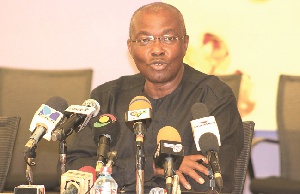The Country Director for the World Bank, Henry Kerali has indicated the need for the Ghana to do much more than what has been done in the past to improve on its current human capital index (HCI) achievements.
Speaking at the launch of the Africa CSO and Parliamentary Development Strategy in Accra, Kerali noted that although Ghana’s HCI is about 44 percent, which places it among the best in West Africa, the country finds itself as the best among a low grouping.
“Think of yourselves as aiming higher; we still have a long way to go to able to catch up with countries like Rwanda, countries in Africa that are higher ranked in Human Capital Index terms but even higher than Rwanda because Ghana is a low middle-income country,” said Kerali.
He called on the country to aspire to achieve the target set or at least averages achieved by other low middle-income countries.
In Ghana, the maternal and child health project, which also has a community health improvement programme plays an important role from the early childhood in addressing issues of maternal fertility and mortality which remains common in the northern part of Ghana.
These program foster the improvement desired to be achieved in the Human Capital Index (HCI).
The launch forms part of a three-day visit by the World Bank Vice President for Africa, Dr. Hafez Ghanem.
US$4bn Human Capital Project for Africa
The World Bank has hinted that Ghana would benefit from a share of a US$4 billion investment in Africa this year, as part of its Human Capital Project for the year.
The bank seeks to invest in the educational sector of the country, productive social protection which seeks to provide funds to help families increase their incomes, a very comprehensive rural water sanitation programme, among others.
About HCI
The HCI measures the amount of human capital that a child born today can expect to attain by age 18. It conveys the productivity of the next generation of workers compared to a benchmark of a complete education and full health.
It is constructed for 157 countries. It is made up of five indicators: the probability of survival to age five, a child’s expected years of schooling, harmonized test scores as a measure of quality of learning, adult survival rate (fraction of 15-year olds that will survive to age 60), and the proportion of children who are not stunted.
As per the findings of the Index, the probability of survival to age 5 is 95 out of 100 children born; thus 95 per cent of babies born in Ghana survive to age 5.
Business News of Sunday, 31 March 2019
Source: goldstreetbusiness.com

















